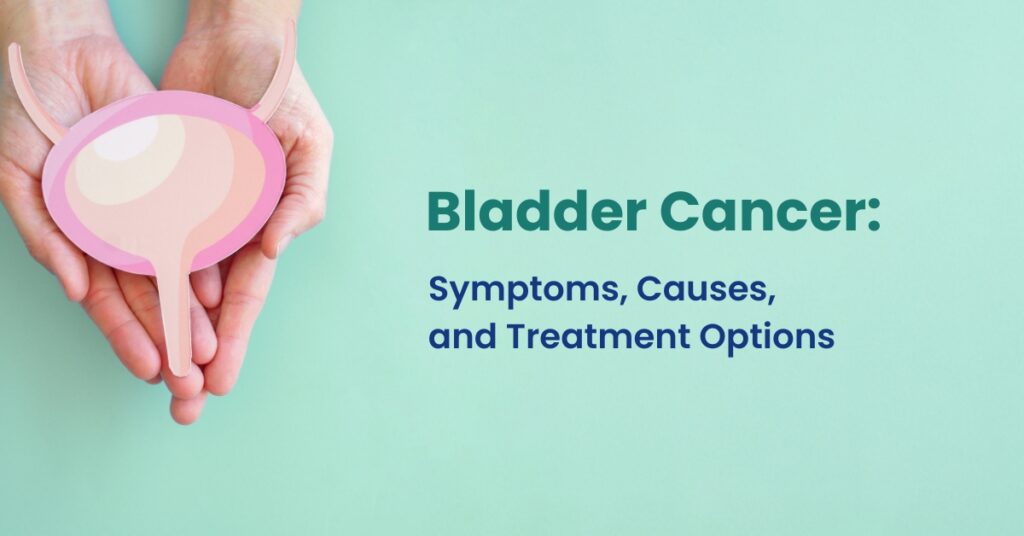Bladder Cancer: Causes, Symptoms, Diagnosis, and Treatment

Table of Contents
Bladder cancer affects countless lives worldwide, making it a formidable health challenge with its widespread occurrence. Recent data reveals its alarming prevalence, consistently ranking among the top 10 most frequently diagnosed cancers globally, with over 550,000 new cases reported annually. While its impact spans across all age groups, it disproportionately affects older adults, especially those aged 55 and above. With a multitude of risk factors, such as smoking, exposure to certain chemicals, and chronic bladder inflammation, bladder cancer underscores the importance of heightened awareness and proactive steps toward prevention and early detection.
What is bladder cancer?
Cancer of the bladder occurs when abnormal cells in the bladder start to grow uncontrollably, eventually creating tumors. These can be benign or malignant. Malignant tumors can invade nearby tissues, spreading to other parts of the body.
Did you know benign tumors are not as dangerous as malignant or cancerous tumors and can be treated easily? Consult an expert to know more.
What are the symptoms of bladder cancer?
Bladder cancer symptoms can vary depending on the stage and type of cancer, but common signs and symptoms include:
- Hematuria (blood in urine)
- Painful or Frequent Urination
- Low Back Pain
- Unexplained Weight Loss
- Loss of appetite
- Swollen Feet
- Extreme Weakness and Fatigue
What are the causes or risk factors of bladder cancer?
Several factors expose one to the risk of developing bladder cancer:
- Mutation of Epithelial Cells: Bladder cancer arises from the mutation of the epithelial cells lining the bladder.
- Tobacco Smoking: Smoking is a great risk factor for bladder cancer, thereby increasing the chances of it arising .
- Chemical Exposure: People in occupations involving chemical exposure, for example, workers in the dye industry, have the highest risk.
- Exposure to Radiation: Previous radiation treatment for various medical conditions increases the chances of contracting bladder cancer.
- Chronic Bladder Infections: Chronic bladder infections result in persistent inflammation of the bladder; therefore, this may lead to the development of bladder cancer.
Signs of an inflamed bladder may include frequent urination, urgency, and discomfort or pain during urination. Don’t ignore the signs, consult an expert today.
How is bladder cancer diagnosed?
The diagnosis of bladder cancer usually includes a series of investigations to confirm the abnormal cells of the bladder and the extent of the disease. Given below is the process:
- Medical History and Physical Examination: It begins with a complete review of the patient’s medical history, including risk factors such as smoking, exposure to certain chemicals, and previous radiation therapy. A physical examination may also be conducted to check for any signs or symptoms of bladder cancer, such as blood in the urine(hematuria) or pelvic pain.
- Urinalysis: A urine sample is collected and analyzed for the presence of blood, abnormal cells, or other signs of bladder cancer.
- Imaging Tests: Several imaging tests can be employed to obtain pictures of the bladder and nearby organs. These may include an ultrasound, CT scan, or MRI. All these imaging tests create detailed pictures of the bladder and surrounding tissues, which help to better understand the size of the tumor and invasion.
- Cystoscopy: This is an advanced procedure wherein a thin, flexible tube, attached to a camera, is inserted into the bladder through the urethra. A urologist can directly see the inside lining of the bladder and identify abnormal growth or suspicious areas. Small tissue samples, or biopsies, may be taken during a cystoscopy to look at under a microscope.
- Biopsy and Pathology: If anything unusual is detected during cystoscopy, small tissue samples (biopsies) are collected from the bladder and sent for examination by a pathologist. Biopsy results from the sample help in determining the presence or absence of cancer, its type, grade, and stage—all of which are very important in its treatment.
Accurate diagnosis and staging are really important to develop an appropriate treatment plan tailored to the individual patient’s condition, which may include surgery, chemotherapy, immunotherapy, or radiation therapy. Further and regular follow-up evaluations are also important for observing the signs of recurrence or progression.
What are the treatment options available for bladder cancer?
Treatment for bladder cancer depends on several factors, which include the type and stage of the cancer, and general health status and preferences. Below are the different treatments generally used for bladder cancer:
- Surgery: In early-stage bladder cancer, Transurethral Resection of Bladder Tumor, or TURBT, is performed. A cystoscope is inserted into the bladder via the urethra, and the tumor is removed using a special tool. Partial or Radical Cystectomy may be necessary for the more advanced stages.
- Radiation Therapy: It utilizes high-energy X-rays to target and destroy cancer cells in the bladder. External Beam Radiation involves directing radiation beams from outside the body onto the bladder area, while Brachytherapy involves placing radioactive sources directly into the bladder. Both techniques aim to shrink tumors, relieve symptoms, and potentially cure or control the progression of bladder cancer. Radiation therapy may be used alone or in combination with other treatments like surgery or chemotherapy, depending on the stage and extent of the cancer.
- Chemotherapy: Systemic chemotherapy involves administering anti-cancer drugs either intravenously or orally, allowing them to circulate throughout the body. This treatment is particularly beneficial for advanced or metastatic bladder cancer, where cancer cells have spread beyond the bladder. Chemotherapy drugs target rapidly dividing cells, including cancer cells, and may be used to shrink tumors, alleviate symptoms, and improve overall survival. Systemic chemotherapy may be used as a primary treatment or in combination with other therapies, such as surgery or radiation.
- Targeted Therapy: This is a precise approach that aims to inhibit specific molecular pathways crucial for cancer cell survival and proliferation. Targeted therapy drugs selectively attack cancer cells while sparing normal tissues. By targeting key genetic mutations or abnormal proteins driving tumor growth, these medications offer a tailored treatment option for bladder cancer patients, potentially improving outcomes and quality of life.
- Immunotherapy: In bladder cancer, where conventional treatments may have limitations, immunotherapy offers a promising approach by unleashing the body’s natural defenses against tumors. Immune checkpoint inhibitors, a type of immunotherapy, block inhibitory pathways that cancer cells use to evade immune detection. This approach can lead to durable responses and long-term remissions in some patients, revolutionizing the treatment landscape for advanced or metastatic bladder cancer.
- Intravesical Therapy: This approach involves delivering immunotherapy or chemotherapy drugs directly into the bladder. By instilling these medications into the bladder through a catheter, they can directly target cancer cells within the bladder lining. This method is particularly effective for treating early-stage bladder cancer and preventing its recurrence.
A multidisciplinary approach involving urologists, medical oncologists, radiation oncologists, and other providers often comprises the personalized treatment plan for bladder cancer. Follow-up care on a routine basis will be needed for monitoring any signs of recurrence or progression and for making treatment decisions.
How can bladder cancer be prevented?
Prevention can be described to minimize the risk of bladder cancer through the following steps:
- Quit Smoking: For smokers, quitting significantly lowers the risk of developing bladder cancer. Smoking cessation not only benefits one’s overall health but also decreases exposure to carcinogens that may damage the lining of the bladder.
- Antioxidant-Rich Diet: Incorporating a diet with many antioxidants, like fruits, vegetables, and foods rich in vitamins C and E, may help protect against bladder cancer. Antioxidants neutralize free radicals in the body, which may decrease cellular damage and lead to cancer.
- Adequate Fluid Intake: For proper bladder health, hydration is very important. Drinking adequate fluids, specifically water, keeps the bladder washed out of toxins and harmful chemicals in the body, thus reducing the time that any toxic chemical has to come into contact with the bladder wall and cause cancer.
What is the current state of bladder cancer clinical trials?
The results of two large clinical trials represent a significant breakthrough in the treatment of advanced bladder cancer, offering new hope to patients with limited effective options. One trial, known as CheckMate-901, investigated the combination of standard chemotherapy with the immunotherapy drug nivolumab, while the second trial, EV-302, focused on a combination of enfortumab, vedotin and pembrolizumab.
Both trials demonstrated that patients treated with these combination therapies lived longer than those treated with chemotherapy alone, marking a remarkable improvement in survival rates. These findings, presented at the European Society for Medical Oncology (ESMO) annual meeting, have been hailed as monumental by experts in bladder cancer treatment, signifying a promising shift in the landscape of bladder cancer therapy after years of limited progress. Enfortumab, in particular, has shown significant efficacy, receiving FDA accelerated approval for the treatment of advanced bladder cancer in recent years.
Conclusion:
Serious conditions, like bladder cancer, require early detection and appropriate treatment. If you’ve got symptoms or concerns, make sure to see a healthcare professional right away. Keep yourself informed, take care of your health, and do what you can to reduce your risk for bladder cancer.
References:
About Author
Dr. A. Venugopal
MD (General Medicine), DM (Medical Oncology), MRCP – SCE Medical Oncology (UK), ECMO (Switzerland).
Dr A. Venugopal is One of the best medical oncologist and Hemato Oncologist in hyderabad, currently serving as the Head of the Department and Senior Medical Oncologist, Hemato Oncologist at Pi Health Cancer Hospital in Gachibowli, Hyderabad. He brings over 15 years of extensive experience in the field of Oncology.

